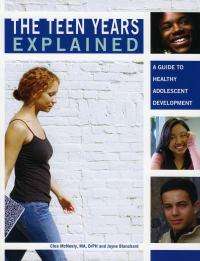Myths about teens busted in new guide for parents

The new book, The Teen Years Explained: A Guide to Healthy Adolescent Development, dispels many common myths about adolescence with the latest scientific findings on the physical, emotional, cognitive, sexual and spiritual development of teens. Authors Clea McNeely and Jayne Blanchard from the Center for Adolescent Health at the Johns Hopkins Bloomberg School of Public Health, provide useful tips and strategies for real-life situations and experiences from bullying, to nutrition and sexuality.
Created in partnership with an alliance of youth-serving professionals, The Teen Years Explained is science-based and accessible. The practical and colorful guide to healthy adolescent development is an essential resource for parents and all people who work with young people.
"Whether you have five minutes or five hours, you will find something useful in the guide," said McNeely. "We want both adults and young people to understand the changes—what is happening and why—so everyone can enjoy this second decade of life."
Popular Myths about Teenagers:
Myth: Teens are bigger risk-takers and thrill-seekers than adults.
Fact: Teens perceive more risk than adults do in certain areas, such as the chance of getting into an accident if they drive with a drunk driver.
Myth: Young people only listen to their friends.
Fact: Young people report that their parents or a caring adult are their greatest influence—especially when it comes to sexual behavior.
Myth: Adolescents live to push your buttons.
Fact: Adolescents may view conflict as a way of expressing themselves, while adults take arguments personally.
Myth: When you're a teenager, you can eat whatever you want and burn it off.
Fact: Obesity rates have tripled for adolescents since 1980.
Myth: Teens don't need sleep.
Fact: Teens need as much sleep or more than they got as children—9 to 10 hours is optimum.
Three years in the making, the guide came about initially at the request of two of the Center's partners, the Maryland Mentoring Partnership and the Maryland Department of Health and Mental Hygiene, who felt there was a need in the community for an easily navigated and engaging look at adolescent development.
"Add The Teen Years Explained to the 'must-read' list," said Karen Pittman, director of the Forum for Youth Investment. "In plain English, the book explains the science behind adolescent development and challenges and empowers adults to invest more attention and more time to young people."















